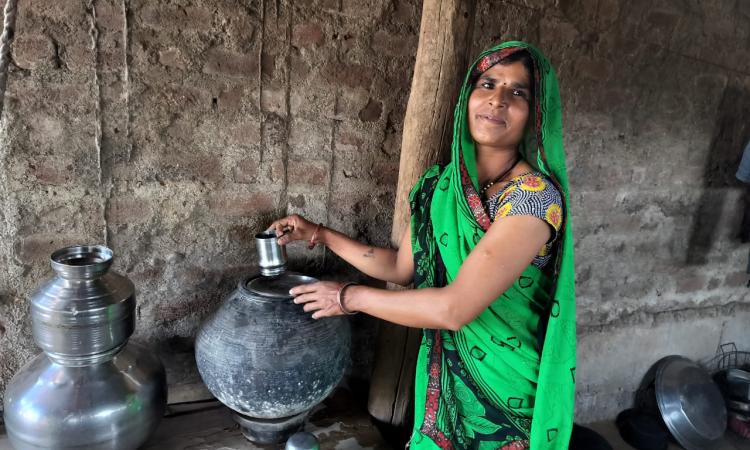
Masru Bai, a 35-year-old woman, along with her husband Naval Singh and their three daughters (Radhika, Sonu, and Vishal) and one son, resides in Beedpura village, Gram Panchayat Bakaner (Dhar district). Both Masru Bai and her husband work as labourers to support their family. Before the implementation of WASH programme and fluorosis mitigation measures, the entire village relied on hand pumps for water, unaware that the water contained harmful fluoride. This lack of knowledge led to various health issues, affecting both children and elderly individuals in the community.
Water challenges and health issues
Masru Bai's family of six struggled with health issues and limited access to clean water. The family's daily struggle for water from the contaminated hand pumps took a toll on their health. Children experienced dental problems, and the elderly faced knee pain. The villagers were unaware of the fluoride content in the water until staff of the Centre for Business and Entrepreneurial Development (CBED), an NGO, conducted water and urine tests, revealing the alarming levels of fluoride. The realisation prompted a shift to using water from the newly installed Jal Jeevan Mission taps, marking a positive change in their water consumption habits.
Implementation of fluorosis mitigation
Upon the revelation of the existence of fluoride in the local water supply, the community responded swiftly and decisively to address the issue at hand. Recognising the potential health hazards associated with fluoride contamination, the community members mobilised to implement effective measures aimed at mitigating the problem and safeguarding the well-being of their residents. The installation of Jal Jeevan Mission taps replaced reliance on contaminated hand pumps.
One of the key initiatives taken was the installation of state-of-the-art Jal Jeevan Mission taps, a significant upgrade from the previously utilized contaminated hand pumps. This strategic move not only marked a departure from reliance on compromised water sources but also symbolised a commitment to providing access to clean and safe drinking water for all community members. This transformation not only improved water quality but also positively impacted the health of the villagers. By ensuring that the water supply was free from fluoride contamination, The residents no longer had to contend with the adverse effects of fluoride, which often manifested in dental issues and knee pain.
Improved hygiene practices
The WASH programme introduced by CBED staff not only focused on clean water but also on improving hygiene practices within households. The staff would visit the households every few days to speak to them about good hygiene practices like washing hands with soap and water before meals and after defecation. Masru Bai shared how, previously, their method of storing water in containers on the ground led to hygiene challenges. With guidance from CBED staff, they elevated the containers, ensuring better cleanliness and reducing the risk of water contamination. This simple change resulted in improved sanitation and reduced the prevalence of waterborne diseases in the village.
Enhanced personal hygiene
The introduction of menstrual hygiene education through CBED's guidance brought about a significant shift in the family's practices. Masru Bai and her daughters transitioned from using cloth during menstruation to using sanitary pads, contributing to better personal hygiene. The family now understands the importance of regular bathing and maintaining cleanliness, practices that were previously hindered by the scarcity of water.
Community awareness and participation
The case study highlights the role of community awareness in implementing sustainable changes. Once the villagers were informed about the water quality and health impacts, they actively participated in adopting healthier practices. Regular meetings and discussions facilitated by CBED staff played a crucial role in fostering a sense of community responsibility and collective action. Village level proposals were submitted to gram sabha for repair of toilets of 21 households, plantation work and construction of pond and other structures for groundwater recharge.
Conclusion
The story of Masru Bai and her family exemplifies the transformative impact of fluorosis mitigation and WASH programme in rural communities. The integration of clean water sources, improved hygiene practices, and community awareness not only enhanced the health and well-being of individuals but also empowered the community to take charge of their overall hygiene. The case study serves as a testament to the positive outcomes achievable through collaborative efforts, education, and sustainable interventions in addressing water-related challenges and promoting holistic well-being in rural areas.
This initiative was supported by Frank Water, UK
/articles/transformative-impact-fluorosis-mitigation-and-wash-programme